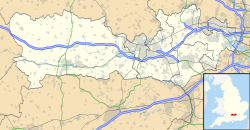| Donnington | |
|---|---|
| Village | |
 | |
Location within Berkshire | |
| OS grid reference | SU467693 |
| Civil parish | |
| Unitary authority | |
| Ceremonial county | |
| Region | |
| Country | England |
| Sovereign state | United Kingdom |
| Post town | Newbury |
| Postcode district | RG14 |
| Dialling code | 01635 |
| Police | Thames Valley |
| Fire | Royal Berkshire |
| Ambulance | South Central |
| UK Parliament | |
Donnington is a village in the civil parish of Shaw-cum-Donnington in West Berkshire, England. It is located north of the town of Newbury. It contains a ruined medieval castle and a Strawberry Hill Gothic mansion.


